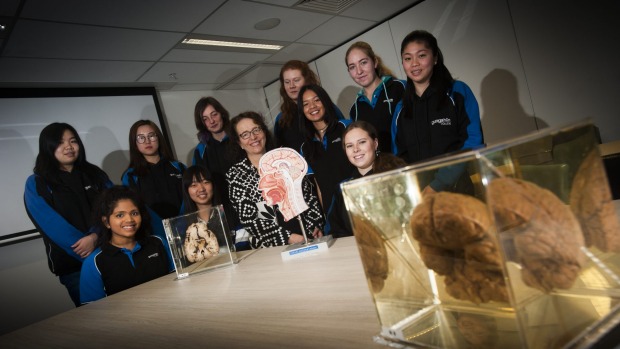
Professor Ingrid Scheffer, who was a keynote speaker at the Canberra Health Annual Research Meeting, talks to year 11 Gungahlin College chemistry students about careers in science. Photo: Elesa Kurtz
The winner of the 2014 Prime Minister’s prize for science, Professor Ingrid Scheffer, believes that quotas are necessary in the medical profession to address gender imbalance at the top levels.
After speaking with a dozen year 11 girls from Gungahlin College on Friday, Professor Scheffer said women were “vastly under represented” at the top levels of medicine and the imbalance would not change without intervention.
“If a woman is assertive then she is labelled so, whereas if a man is assertive he is just seen as being a man, so we talked about that a little,” she said.
“To be assertive as a woman you often need to have a lot of knowledge behind you while this is sometimes different for men.”
The pair were jointly awarded the 2014 Prime Minister’s Prize for Science and $300,000 prize money for their work, which led to targeted research and better treatments.
Professor Scheffer, who was a keynote speaker at the Canberra Health Annual Research Meeting, said young women should aspire to exciting and diverse careers in science and medicine.
“I used to be horrified by the thought of quotas but I have moved on from that as I don’t think the imbalance will solve itself,” she said
“When you are evaluating someone for a career and one candidate has two children and the other has managed to acquire several grants during that period, it is impossible to compare them.
“Without quotas, it is going to be a long and frustrating time until change occurs”
Professor Scheffer said there was no shortage of women in the junior levels of medicine and science although men continued to be over represented at the top positions.
“The imbalance is not that great when you enter medicine but at the higher echelons of the profession it remains a little bit like the situation seen in many boardrooms in Australia,” she said.
But she remained positive about the profession and urged the Gungahlin College students to seek and exciting and challenging careers.
“I told them building a successful career involves a fair bit of serendipity and it all begins by following your interests and eventually finding a mentor and new opportunities,” she said.
“I told them I haven’t had three careers in a lifetime but three careers in a day; educator, researcher and clinician.
“Why else would I do this than to make a difference and to touch the lives of those beyond who you can see?”
